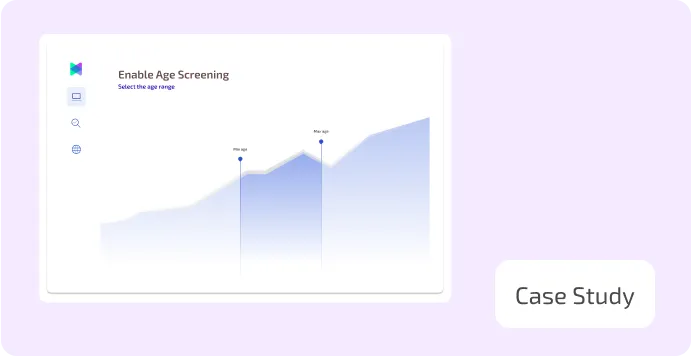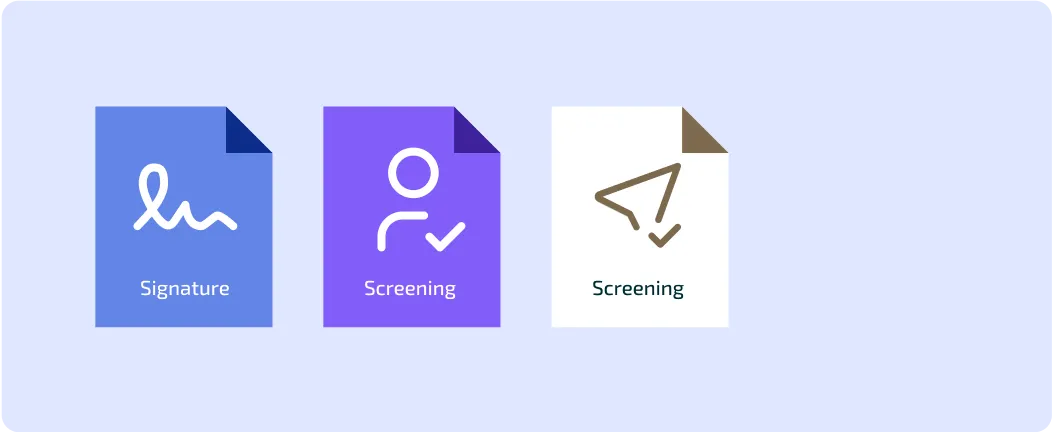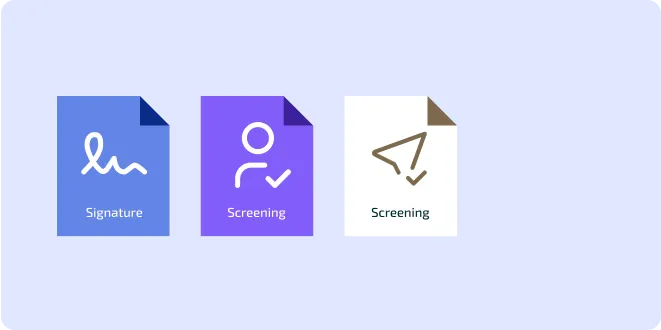.webp)
Published on
April 4, 2025
The Best 15 KYC Software Solutions in 2025 Reviewed
In this story
.png)
Accelerate AML Compliance: Meet Regulatory Demands with 80% Less Setup Time
.svg)
.svg)
In this comprehensive review, we compare the best 15 KYC software platforms, namely: FOCAL, Veriff, Comply Advantage, KYC Chain, iComply, iDenfy, SEON, Ondato, Persona, Sumsub, Onfido, Shufti Pro, NorthRow, AU10TIX, and Plaid. These platforms are evaluated based on their key features, technological capabilities, compliance support, fraud prevention measures, and overall efficiency in streamlining identity verification processes.
Whether you are looking for AI-driven automation, biometric authentication, or blockchain-based security, this guide will help you determine the best KYC solution for your organization's compliance needs.
What is KYC Software?
Know Your Customer software, also known as KYC software, is a tool businesses use to verify their customers' identities. The tool/software enables those businesses to ensure that the people they're dealing with are genuine by collecting and checking their information against various databases. KYC verification software solutions are especially important for industries like banking and finance to prevent fraud and meet or comply with legal requirements.
Where KYC Compliance Is Used
KYC compliance helps businesses verify who their customers are, stop fraud, and follow the law. Let’s break down where KYC is used:
- Banking: Banks use KYC to check customers' identities when they open accounts or apply for loans.
- Financial Services and Brokers: Investment companies and brokers also rely on KYC to verify investors’ identities.
- Fintech Companies: Many fintech services, like digital wallets, peer-to-peer lending, and crowdfunding, use KYC to keep transactions secure.
- Cryptocurrency: Crypto exchanges must have strong KYC processes to comply with anti-money laundering laws.
- Transport and Ride-Sharing Services: Companies in the transport industry, like ride-sharing apps, use KYC to check the identities of drivers and passengers.
- Insurance: KYC helps insurance companies confirm who their customers are.
- Ecommerce and Online Marketplaces: Online shopping platforms use KYC to verify both buyers and sellers.
- Telecommunications: Telecom companies check identities when they issue SIM cards or set up new accounts. This helps stop identity theft and fraud in mobile services.
Best 15 KYC Software Vendors: An Overview
In the below table, we give an overview for the top KYC service providers
Top Features of KYC Software
KYC check software solutions for businesses are designed to help companies verify customer identities and comply with regulations. Top eKYC solution providers offer digital verification tools that enhance the customer onboarding process. The following features are the most common ones among KYC service providers:
- Identity verification: KYC tools for banks and other businesses are used to confirm who their customers really are. This can be done by comparing personal details against trusted databases, using biometric scans, or even facial recognition.
- Document Scanning and Processing: KYC systems can scan and read documents like passports or driver’s licenses. This makes collecting and verifying data quicker and more accurate, without the need for humans to handle every step.
- Compliance Checks: KYC software runs checks to make sure businesses are following AML laws and regulations.
- Risk Assessment: These solutions assess the risk associated with each customer based on factors such as their financial history, geographical location, and transaction behavior.
- Customer Due Diligence: This feature helps companies dig deeper into who their customers are, checking their background and activities.
- Watchlist Screening & Sanctions Lists & PEP Databases: KYC solutions can check people’s names against global watchlists, sanctions lists, or databases of politically exposed persons (PEP).
- Audit Trails and Reporting: These tools keep detailed records of everything related to KYC; who was checked, what was verified, and how.
- Integration with Third-Party Data Providers: Many KYC systems pull in data from outside sources to improve accuracy. This could include checking credit scores, confirming addresses, or verifying someone’s identity with extra layers of information.
- Workflow Automation: KYC check software can automate repetitive tasks, making the process smoother. Things like making automatic decisions for low-risk customers or organizing tasks so they’re done in the right order, without needing constant human oversight.
- Customer Onboarding: These systems and KYC tools for banks also make it easier for new customers to sign up. Features like uploading documents online, signing forms electronically, or even doing everything from a self-service portal make the whole onboarding process quicker and more convenient for everyone involved.
Learn How Aseel achieved a 7.5 times faster onboarding time using FOCAL
Comply quickly with local/global regulations with 80% less setup time
.svg)
.svg)
15 Best KYC Software Solutions In 2025
Yes, KYC technology solutions use advanced algorithms to enhance the accuracy and efficiency of customer verification and partnering with a top AML KYC provider ensures your business adheres to regulatory standards and reduces risks. Therefore, we’re providing you with the 15 best KYC automation software and popular KYC providers in 2025.
Please note that the information you're about to read about the KYC software providers comes from online research and online user feedback and reviews. If you need an update or spot any inaccuracies, feel free to reach out for clarification or revisions. We're here to help!
1. FOCAL
G2 Rating: 4.6/5
FOCAL, one of the top KYC service providers, stands out for its ability to simplify the onboarding process, improve risk assessment, fine-tune compliance adherence, and unbundle data to make informed decision-making.
With pinpoint accuracy in both Arabic and Latin name matching, coupled with its proactive threat detection and monitoring, FOCAL emerges as the go-to choice. It is saving time and minimizing errors while anchoring the compliance framework, paving the way for operational brilliance and strategic triumph.
Key Features:
- Tailored Industry Solutions: FOCAL meets industry-specific needs with a robust detection engine for agile compliance and reduced false positives.
- Easy API Integration: Seamlessly integrate our technology into your systems, and start leveraging our risk and compliance solutions with unparalleled speed and simplicity.
- Localized Expertise with Global Standards: FOCAL provides MENA-based expertise for regulatory compliance and regional market understanding while upholding global standards of support and technical excellence.
- Identity Verification: FOCAL, a popular KYC provider, offers comprehensive verification services including National ID verification through official databases, commercial registration checks to confirm business legitimacy, IBAN validation to ensure accurate bank account details, and address verification with authoritative regional databases.
- Customer Screening: FOCAL customer screening service detects high-risk entities by continuously screening against over 1300 sanctions, PEP, RCA, and adverse media watchlists.
- System Dependability: FOCAL, a KYC software for banks and other financial institutions, offers a reliable platform with 99.95% uptime and an SLA that exceeds industry standards for compliance support.
- End-to-End Platform Scalability: Streamlined risk and compliance management with FOCAL platform that scales with your business, eliminating the need for multiple vendors.


Read more How Aseel reduced onboarding time by more than 87% using FOCAL
2. iDenfy
G2 Rating: 4.9/5
iDenfy, a prominent anti-fraud and compliance firm specializes in identity verification, AML (Anti-Money Laundering), and KYB (Know Your Business) solutions. iDenfy offers a strong platform supporting over 3000 identity documents from 200 countries and territories.
Key Features:
- iDenfy enables the recognition, verification, and extraction of information from over 500 identity documents across 190 countries.
- The platform's direct integration allows for seamless screening of PEPs, sanctions lists, and adverse media.
- iDenfy employs facial recognition technology and advanced biometric algorithms to ensure high accuracy in face comparison.
3. SEON
G2 Rating: 4.6/5
SEON, an AML KYC provider, stands out as a valuable asset for analyzing digital footprints. This helps users uncover their customers' genuine intentions.
Key Features:
- SEON enables the examination of social signals to identify potential red flags associated with user activity.
- SEON provides transparent pricing models, ensuring clarity and predictability for users. Starts at $599.
- SEON's capabilities extend to AML requirements, to ensure suitability for regulatory compliance needs.
4. Ondato
G2 Rating: 4.7/5
Ondato, one of the best KYC service providers, offers a comprehensive solution for KYC (Know Your Customer) and identity verification, prioritizing user-friendly experiences.
Key Features:
- Ondato enables businesses to establish a virtual branch for seamless remote connections with customers.
- Ondato provides NFC Identification.
- Ondato offers a comprehensive suite of KYC tools, including video verification, e-signatures, NFC verification, and biometrics, among others.
- Businesses have the option to white-label Ondato's solution, allowing them to customize branding for a seamless customer experience.
5. Sumsub
G2 Rating: 4.6/5
Sumsub is one of the best KYC service providers offering a range of features designed to streamline identity verification processes. As a KYC management software, it helps organizations maintain accurate and up-to-date customer records.
Key Features:
- Comprehensive Document Coverage
- Liveness and Face Match (Confirm identity through live facial recognition)
- Live Agent Video Call (Real-time assistance for verification processes)
- Doc-free Verification (Seamless verification without document submission)
- QES/eIDAS
- Verification via Near Field Communication (NFC)
- Known Face Search
6. ComplyAdvantage
G2 Rating: 4.4/5
ComplyAdvantage Know Your Client software simplifies compliance processes. Through its platform, users can conduct customer screening, transaction monitoring, and media checks, all accessible via easy API integration.
One of the standouts features of ComplyAdvantage, a top KYC provider, is its free version for fintech startups. This offering, coupled with transparent pricing plans, underscores the platform's commitment to user-friendly compliance solutions.
Key Features:
- AI-driven AML Verification
- Easy API Integration
- Automated Monitoring (for transactions and customer data)
- Comprehensive Reporting
7. KYC-Chain
G2 Rating: 4.8/5
KYC-Chain is one of the best AML KYC providers that offers a comprehensive suite of tools for identity verification, Know Your Customer (KYC), and Anti-Money Laundering (AML) checks.
One of KYC-Chain Know Your Client software's standout features is the incorporation of blockchain technology for KYC purposes. This innovative approach allows users to securely store their KYC details on the blockchain.
With a bank-grade compliance toolkit, KYC-Chain boasts the capability to scan over 10,000 data sources across 240 countries in just 30 seconds.
It is worth noting that the best eCommerce KYC solution/eCommerce KYC platform integrates seamlessly with online platforms for efficient customer verification. And this KYC compliance solution is crucial for online businesses to meet legal requirements and prevent fraud.
Key Features:
- KYC-Chain’s KYC screening tools offer insights into how shared ledgers can be utilized for ID verification. This is a valuable resource for understanding blockchain-based KYC.
- KYC-Chain addresses the KYC and AML requirements prevalent in the cryptocurrency market.
- The platform offers flexibility and scalability, allowing customization to meet specific requirements, compliance with GDPR regulations, seamless integration with applications through RESTful API, and handling large volumes of checks per day.
8. iComply
G2 Rating: 4.3/5
iComply, also known as iComplyKYC, stands as a powerful solution offering a full suite of tools tailored for identity validation and compliance needs. Through its platform, users can access a variety of essential tools, including document verification, identity proofing, and biometric authentication for strong identity verification.
What sets iComply apart is its comprehensive KYB (Know Your Business) tools. The platform also provides extensive AML tools, such as watchlists, PEP checks, and adverse media screening. These modular tools allow users to enable or disable them based on their specific regulatory requirements.
Key Features:
- iComply offers flexible integration options, allowing seamless integration via API, JavaScript, or on-premise deployment, catering to diverse business needs.
- KYC, KYB, and AML tools that integrate seamlessly with your existing business processes.
9. Persona
G2 Rating: 4.4/5
Persona, one of the top KYC platform providers, offers a versatile KYC onboarding solution designed to meet compliance requirements across diverse regions. With coverage spanning over 200 countries and territories, Persona allows businesses to create customized verification flows tailored to their specific needs.
Key Features:
- Businesses can customize every aspect of their verification flows, including the look and feel, data collection process, user experience, and friction points, ensuring seamless onboarding experiences for customers.
- Persona serves as an identity verification management solution for businesses of all sizes, from startups to large enterprises.
- Persona offers flexible workflow design capabilities, allowing businesses to create efficient and effective verification processes tailored to their specific requirements.
10. Verrif
G2 Rating: No Ratting
Veriff is also one of the best KYC AML providers. Verrif KYC software for banks stands as a reliable solution for identity verification and KYC (Know Your Customer) processes in the digital sphere.
As a frontrunner in identity verification and KYC automation, Veriff enables businesses to uphold regulatory compliance without hindering customer acquisition. Boasting a 98% check automation rate and an average decision time of 6 seconds, Veriff's platform encompasses over 11,000 identity documents, achieving a commendable 95% verification success rate on the initial attempt.
Focused primarily on online identity verification, Veriff serves individuals and businesses across various sectors, and its pricing models are tailored to usage and feature requirements.
Key Features:
- APIs and SDK
- Advanced Biometric Authentication
- AI Automation
- Free Retries (Multiple attempts for successful verification)
- Multilingual Support
11. Onfido
Onfido is one of the leading KYC platform providers known for its AI KYC tools and identity verification solutions, which help businesses comply with KYC and AML regulations across multiple regions. The platform utilizes biometric analysis, document authentication, and fraud detection to verify customer identities accurately and efficiently. Supporting over 2,500 document types, Onfido enhances security by cross-referencing identity information with trusted data sources.
One of Onfido’s key advancements is its Real Identity Platform, introduced to streamline the verification process through a combination of biometric verification, fraud detection signals, and data authentication. This platform aims to make identity verification more seamless and adaptive, reducing friction in digital customer onboarding while maintaining high security standards.
12. Shufti Pro
Shufti Pro offers AI KYC tools with 98.67% accuracy, global coverage across 230+ countries, and support for 3,000+ document types in 150+ languages. Its multi-factor authentication, including facial recognition and biometrics, enhances security, while real-time processing (15-60 seconds) ensures a seamless customer experience.
Additionally, its AML screening cross-checks individuals against 1,700+ watchlists, helping businesses prevent fraud and comply with regulatory standards efficiently. These capabilities make Shufti Pro a trusted solution for secure and compliant identity verification.
13. NorthRow
NorthRow is one of the top KYC solution providers offering a unified platform for KYC, KYB, and AML checks, streamlining compliance and simplifying verification processes for individuals and businesses. Key features include real-time monitoring and alerts for risk changes, and seamless integration with existing systems through its API, ensuring operational efficiency. These capabilities help businesses stay compliant, mitigate risks, and enhance their customer onboarding experience.
14. AU10TIX
AU10TIX is one of the top KYC solution providers known for its advanced identity verification solutions. Key features of its KYC management software include:
- Multi-Credential Support: Verifies physical documents, digital IDs, and NFC-enabled devices, ensuring secure and flexible identification.
- Document Forgery Detection: Uses over 150 checks to detect document tampering and ensure authenticity.
- Biometric Verification & Selfie Matching: Matches live selfies with ID photos for enhanced security.
- Auto-Capture & Real-Time Feedback: Improves image quality and guides users for smoother onboarding.
- Global Coverage & Compliance: Supports over 240 countries, ensuring compliance with global regulations.
- Seamless Integration: Offers customizable APIs and SDKs for easy integration with existing systems.
15. Plaid
Plaid is a top KYC provider known for its advanced identity verification features. Key strengths include:
- Identity Verification: Cross-references user information with trusted databases and verifies global ID documents, enhancing security.
- Anti-Fraud Measures: Detects fraud using risk signals like email, phone number, and device ID.
- Global Coverage: Supports over 16,000 ID types in 200+ countries, ensuring compliance with regional regulations.
- Efficient Onboarding: Verifies identities in 30 seconds, improving user experience and conversion rates.
- Seamless Integration: Offers easy integration with a no-code editor for quick implementation.
The Best KYC Software Providers: Side-By-Side Comparison
8 Technologies Driving KYC Innovation: Exploring Pros and Cons
In this section, we will outline the pros and cons of each technology commonly used in KYC software:
1. Artificial Intelligence (AI) and Machine Learning (ML)
Pros:
- Improved accuracy and efficiency in identity verification and risk assessment.
- Ability to analyze large datasets and detect patterns that may indicate suspicious activities.
- Continuous learning and adaptation to evolving threats and regulatory changes.
Cons:
- Dependency on quality and quantity of training data, which can introduce biases or inaccuracies.
- Complexity in interpreting AI/ML outputs and ensuring transparency in decision-making processes.
- Potential for adversarial attacks or exploitation of AI/ML algorithms vulnerabilities.
2. Biometric Authentication
Pros:
- Enhanced security through unique and reliable identification methods.
- Reduced reliance on traditional authentication methods such as passwords or PINs.
- Convenience for customers with seamless and frictionless authentication experiences.
Cons:
- Privacy concerns regarding the collection and storage of biometric data.
- Risk of false positives or false negatives in biometric recognition, particularly in diverse populations.
- Potential for biometric data theft or spoofing attacks, necessitating robust security measures.
3. Blockchain
Pros:
- Immutable and tamper-proof records of customer identities and transactions.
- Decentralized identity management, giving customers greater control over their personal data.
- Enhanced transparency and auditability of KYC processes, improving trust and accountability.
Cons:
- Scalability and performance limitations associated with blockchain networks.
- Regulatory uncertainty and legal challenges regarding the use of blockchain for identity verification.
- Complexity in integrating blockchain solutions with existing KYC infrastructure and workflows.
4. Data Analytics
Pros:
- Insights-driven decision-making to identify risks, trends, and opportunities.
- Predictive analytics capabilities for proactive risk management and compliance monitoring.
- Optimization of KYC processes through data-driven automation and efficiency gains.
Cons:
- Challenges in data quality and governance lead to inaccurate or biased analytics results.
- Privacy and regulatory concerns related to collecting, storing, and using customer data.
- Resource-intensive implementation and maintenance of data analytics infrastructure and tools.
5. Document Recognition and OCR (Optical Character Recognition)
Pros:
- Automation of data extraction from identity documents, reducing manual effort and errors.
- Faster processing times for identity verification and customer onboarding.
- Improved accuracy and consistency in capturing relevant information from diverse document types.
Cons:
- Limitations in OCR accuracy, particularly with handwritten or poorly scanned documents.
- Challenges in handling non-standard document formats or languages not supported by OCR systems.
- Vulnerabilities to spoofing attacks or manipulation of scanned documents.
6. APIs (Application Programming Interfaces)
Pros:
- Seamless integration with third-party data providers, regulatory databases, and other systems.
- Access to a wide range of external data sources to enhance identity verification and risk assessment.
- Flexibility and scalability in extending KYC capabilities through API-based integrations.
Cons:
- Dependency on third-party APIs, introducing potential points of failure or service disruptions.
- Complexity in managing API integrations, including versioning, authentication, and data synchronization.
- Security risks associated with unauthorized access or misuse of APIs, requiring robust access controls and monitoring.
7. Real-time Video and Liveness Verification
Pros:
- Enhanced security through real-time verification of customer identity.
- Integration of video streaming for improved verification accuracy.
Cons:
- High friction in the customer journey due to additional steps and potential delays.
- Susceptibility to fraud through doctored documents and videos (deepfakes).
8. Digital Footprint Analysis
Pros:
- Fast and frictionless analysis of customer behavior and online presence.
- Ability to identify suspicious behavior and filter out fraudulent users.
Cons:
- Insufficient as a standalone technique for confirming identity.
- Lack of confirmation for document quality or identity verification.
Read more about: Browser fingerprints and Device fingerprints
How To Choose The Right KYC Software For Your Business?
If you're on the hunt for the perfect KYC screening software, here are some things you should keep in mind when you're out there looking for the best fit for your business:
- First, you will have to ensure that the software of your choice meets the requirements in regard to your industry and geographic location.
- Coverage is key, too. Be sure that the software covers countries and territories, sanctions lists and watchlists, PEPs and other high-risk customers.
- Integration is also important. You are looking for something that easy to integrate with other systems. Search for a software that will make very little disruption to your existing infrastructure and organization workflows.
- In terms of customization, you want software that is as unique as your operations, so you should be able to alter details including the way you brand your software, its interface, and how results are compiled.
- Scalability matters, too. You would like something that has the capability to scale up as your business grows and flourishes.
- Security is non-negotiable. The data you are processing here is the customer data, so ensure that this software has tight security features to maintain the privacy of the data.
- The user experience should not be set aside. Ideally, it should be simple for all your staff members.
- Customer support is the cherry on top. You want a vendor that's got your back when you need help. Look for someone who offers responsive support and plenty of training resources to help you get the most out of your software.
- And, of course, do not forget about the expenses. It has to be reasonable in terms of the price; do not go looking for the cheapest option, look for one that has value for your money!
Conclusion
All in all, the selection of the right KYC software for any given business is an important process that should involve the analysis of several aspects. In this regard, it can be stated that the usage of one or another strategy may differ since what is effective for one business can be ineffective in the case of another one. Therefore, one is advised to take their time to look at the specific needs that they have before arriving at a conclusion.
Please remember to perform a pre-analysis and weigh the pros and cons of the best KYC providers, and assess the value proposition for the solution as a whole but also the specific features before you make your decision. Partnering with a top rated KYC provider can enhance your organization's compliance and risk management.
Finally, it is important to state that all the information considered in this comparison between the best KYC providers was gathered through careful online/internet research. If there is anything that seems to be inaccurate or if you need clarification on any information, please do not hesitate to contact me.
FAQs
Q1. What are the risks of failing to comply with KYC regulations?
Failing to comply with KYC regulations can lead to serious consequences. You might face heavy fines, legal trouble, or even lose your ability to operate. Plus, non-compliance puts your business at greater risk for fraud and financial crime, which can damage your reputation. In the long run, it could scare away potential customers or partners who don’t want to work with a company that seems risky.
Q2. What key features should I consider when choosing KYC software?
When you're choosing between KYC automation tools, first, you need to make sure the screening tools in KYC can verify identities quickly and accurately. You also want software that offers strong risk management tools and can easily integrate with your existing systems. It’s helpful if the platform is flexible and scalable; meaning it can grow with your business needs, and keeps you compliant with any new regulations that might come up in your industry.
Q3. How does KYC software add value to my business beyond compliance?
Screening tools in KYC makes onboarding faster, which gives your customers a smoother experience. It can also help prevent fraud by catching suspicious activity early on. Plus, KYC automation tools reduce manual tasks, saving you time and cutting down on mistakes. With the right insights from KYC data, you can even make better decisions that help your business grow.
Streamline Compliance: Achieve 80% Faster Setup for Fraud Prevention
.svg)
.svg)

How Aseel reduced onboarding time by more than 87% using FOCAL
Learn how FOCAL empowered Aseel to achieve new milestones.
.svg)
.svg)
Mastering Fraud Prevention: A Comprehensive Guide for KSA and MENA Businesses
51% of organizations fell victim to fraud in the last two years, don't be caught off guard, act proactively.
.svg)
.svg)
Featured blog posts
.svg)





AI-Driven Precision in Fraud Risk and AML Compliance
.svg)
.svg)

.svg)
.png)






.webp)




.svg)








%20(1).webp)
Comments
Leave a Reply
Comment policy: We love comments and appreciate the time that readers spend to share ideas and give feedback. However, all comments are manually moderated and those deemed to be spam or solely promotional will be deleted.